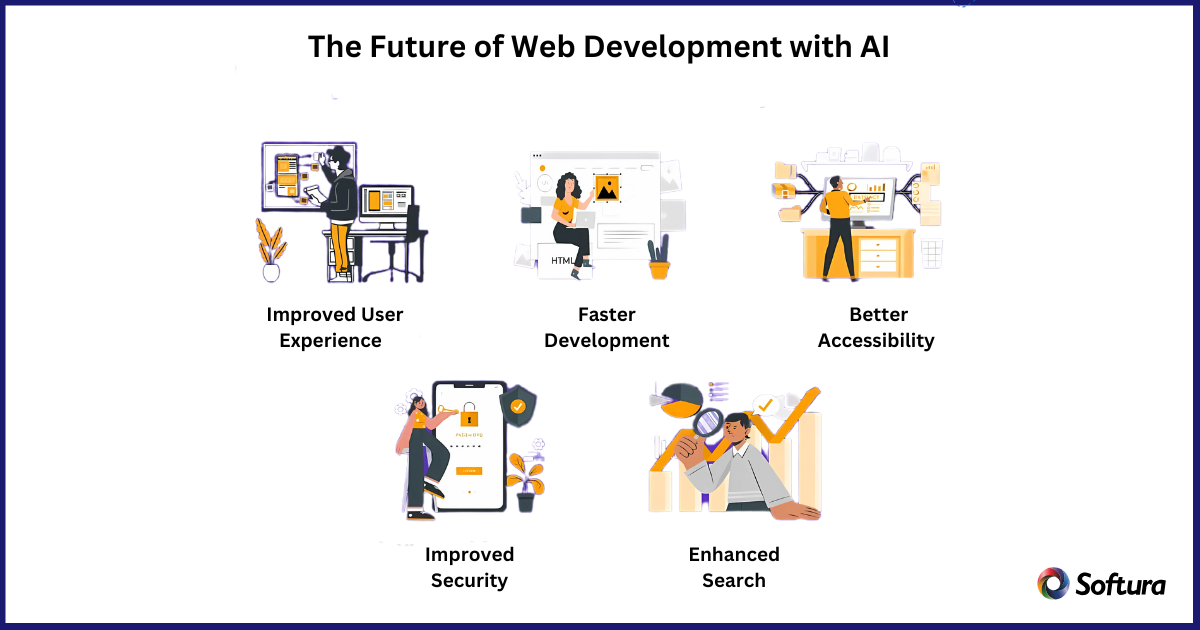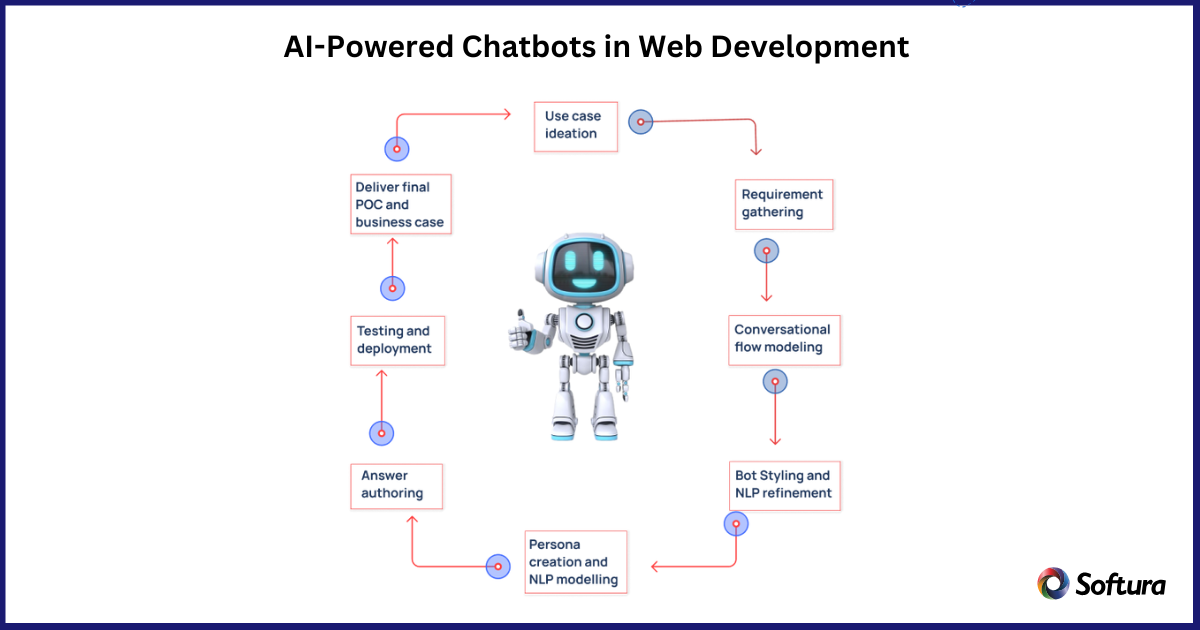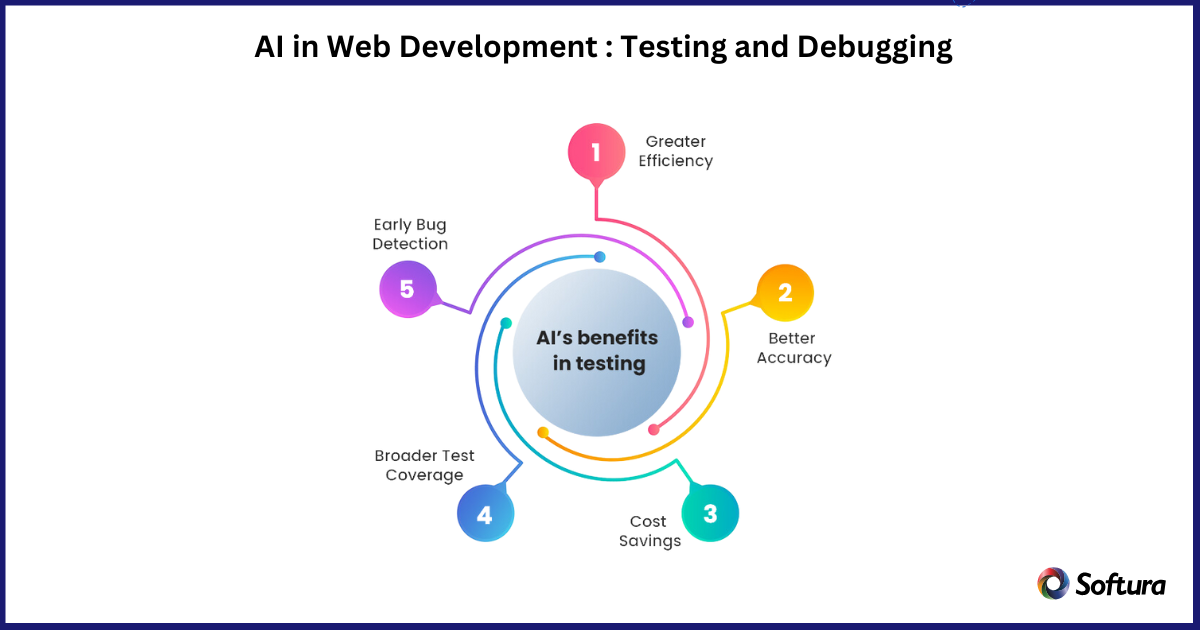"Our integration with the Google Nest smart thermostats through Aidoo Pro represents an unprecedented leap forward for our industry."
- Antonio Mediato, founder and CEO of Airzone.
Artificial Intelligence (AI) has been making waves across industries, and web development is no exception. From automating tasks to enhancing user experience, AI in web development is becoming an essential tool for businesses and developers alike. As web app grow more complex, leveraging AI can help streamline processes, reduce development time, and improve overall site performance. In this post, we'll dive into the many ways AI is reshaping web app development and why it's important for businesses to stay ahead of the curve.

One of the biggest impacts of AI in web development is its ability to enhance user experience through personalization. AI analyzes user behavior, preferences, and interactions to tailor content, product recommendations, and user interfaces specifically for each visitor.
Business case: Amazon is a prime example. The platform uses AI algorithms to recommend products based on users' past purchases, search history, and browsing behavior. This personalized experience not only increases engagement but also drives sales and customer loyalty.
Real-life scenario: Imagine visiting an e-commerce site where the homepage, product recommendations, and even promotions are customized to your preferences without any manual input. AI does this in real-time by analyzing your interactions with the site. This makes the user experience more relevant and enjoyable, which ultimately boosts conversion rates.
"Our integration with the Google Nest smart thermostats through Aidoo Pro represents an unprecedented leap forward for our industry."
- Antonio Mediato, founder and CEO of Airzone.
One of the most valuable contributions of AI in web development is automation. AI can take over repetitive tasks that developers typically handle, such as generating code, running tests, or even suggesting design elements. This allows developers to focus on more complex aspects of a project, speeding up the entire development process.
Business case: Companies like Wix and Squarespace have already integrated AI into their platforms, allowing users to build websites with minimal coding knowledge. Their AI-powered website builders can automate tasks like layout generation and style selection based on user preferences, cutting down development time significantly.
Real-life scenario: Let’s say you're developing a website with multiple pages. AI can automate tasks like creating navigation menus, auto-filling metadata, or suggesting layout designs based on user behavior. This not only saves time but also ensures a consistent and user-friendly design across the site.
"By analyzing the data from our connected lights, devices and systems, our goal is to create additional value for our customers through data-enabled services that unlock new capabilities and experiences."
- Harsh Chitale, leader of Philips Lighting’s Professional Business.
Onboard dedicated Offshore App Developers
Develop Mobile application and integrate it into your business processes with Softura's dedicated offshore mobile app developers!
AI can play a critical role in improving website performance by analyzing vast amounts of data and providing actionable insights. Through AI-powered analytics, developers can monitor user behavior, load times, and traffic patterns to optimize websites for speed, usability, and engagement.
Business case: Google Analytics is an example of how AI can analyze user data to provide insights on website performance. Businesses can see which pages are performing well and which ones need improvement, helping them make data-driven decisions.
Real-life scenario: Imagine running an e-commerce store and using AI to analyze which products get the most clicks or what parts of your checkout process cause users to drop off. AI can identify patterns and offer suggestions to improve user experience, leading to better conversion rates and lower bounce rates.
"By analyzing the data from our connected lights, devices and systems, our goal is to create additional value for our customers through data-enabled services that unlock new capabilities and experiences."
- Harsh Chitale, leader of Philips Lighting’s Professional Business.
AI is transforming web design by enabling developers to create smarter, more adaptive interfaces that automatically adjust based on user behavior. These interfaces can learn from user interactions and adapt layouts, color schemes, or navigation elements in real-time, providing a more intuitive and seamless experience.
Business case: The Grid, an AI-powered web design platform, introduced the concept of websites that design themselves. The platform automatically adjusts content, layout, and design elements based on user behavior, reducing the need for manual intervention.
Real-life scenario: Picture a website that changes its navigation menu based on the pages a user frequently visits. AI can track these behaviors and make adjustments on the fly, helping users find what they’re looking for more quickly and improving overall satisfaction
"By analyzing the data from our connected lights, devices and systems, our goal is to create additional value for our customers through data-enabled services that unlock new capabilities and experiences."
- Harsh Chitale, leader of Philips Lighting’s Professional Business.
In an era where data breaches and cyberattacks are on the rise, AI has become a critical tool for boosting web security. AI can monitor websites for suspicious activity, detect vulnerabilities, and respond to potential threats in real-time, reducing the risk of security breaches.
Business case: Companies like Cloudflare use AI to monitor traffic and identify potential security threats such as DDoS attacks. AI analyzes patterns in real-time and can automatically block malicious traffic, preventing downtime and protecting sensitive data.
Real-life scenario: Let’s say you run a large-scale e-commerce site. AI can continuously scan your website for vulnerabilities, detect unusual login attempts, and flag suspicious transactions. By catching these issues early, AI can prevent costly data breaches and ensure your site remains secure.

Chatbots powered by AI have become a staple in modern web development, providing instant, 24/7 customer support. These AI-driven assistants can handle routine queries, guide users through troubleshooting, and even complete transactions, reducing the need for human intervention.
Business case: H&M uses an AI chatbot to help customers with product recommendations, order status inquiries, and even outfit suggestions. By automating these interactions, the company has significantly reduced wait times and improved customer satisfaction.
Real-life scenario: Imagine visiting a customer service page and instantly being greeted by a chatbot that can resolve your issue without the need to speak to a human. Whether it’s tracking your order or answering FAQs, AI chatbots can provide quick, accurate responses, improving the overall user experience.
"Our integration with the Google Nest smart thermostats through Aidoo Pro represents an unprecedented leap forward for our industry."
- Antonio Mediato, founder and CEO of Airzone.
Testing and debugging are essential steps in web development, and AI is streamlining these processes. AI-powered tools can automatically test websites, detect bugs, and even suggest fixes, reducing the time and effort required for manual testing.
Business case: Companies like Sauce Labs use AI to automate testing across multiple browsers and devices. This not only reduces testing time but also ensures that websites function seamlessly across all platforms, improving the user experience.
Real-life scenario: Picture an AI tool that runs hundreds of tests on your website in seconds, checking for functionality, usability, and compatibility issues. If it detects an error, it not only flags the issue but also suggests a solution, drastically reducing development time and ensuring a high-quality, bug-free website.

"Our integration with the Google Nest smart thermostats through Aidoo Pro represents an unprecedented leap forward for our industry."
- Antonio Mediato, founder and CEO of Airzone.
Creating engaging content is time-consuming, but AI is making it easier for developers to automate content creation. AI tools can generate articles, social media posts, and even product descriptions, freeing up time for more strategic tasks.
Business case: The Washington Post uses an AI system called Heliograf to automatically generate news reports, particularly for high-volume but low-complexity topics like sports scores or election results. This allows journalists to focus on more in-depth stories while AI handles the rest.
Real-life scenario: If you run an online store, AI can generate product descriptions based on specifications, automatically update inventory descriptions, and even create blog posts that align with your SEO strategy. This automation can save countless hours while keeping your website fresh and relevant.
"Our integration with the Google Nest smart thermostats through Aidoo Pro represents an unprecedented leap forward for our industry."
- Antonio Mediato, founder and CEO of Airzone.
Looking ahead, the role of AI in web development will only continue to grow. As AI technologies advance, we can expect even more sophisticated automation, better user experiences, and smarter websites that adapt to changing user behaviors and business needs.
Business case: Emerging trends such as AI-driven voice interfaces and predictive user behavior modeling are already being adopted by companies like Google and Apple. As these technologies become more mainstream, developers will need to integrate them into their websites to stay competitive.
Real-life scenario: In the future, AI might enable websites to predict user actions before they happen, providing personalized content or recommendations as users navigate the site. This level of anticipation will transform how users interact with websites, making AI an indispensable tool for web developers.
The integration of AI in web development is no longer a futuristic concept—it’s happening now, and the benefits are undeniable. From enhancing user experience to automating repetitive tasks, AI is transforming how websites are built, maintained, and optimized. As businesses and developers continue to adopt AI technologies, the future of custom web app development looks smarter, faster, and more efficient than ever. If you're not already exploring AI-driven solutions for your web projects, now is the time to start.
"Our integration with the Google Nest smart thermostats through Aidoo Pro represents an unprecedented leap forward for our industry."
- Antonio Mediato, founder and CEO of Airzone.
Are you ready for your next project?
Unlock your company's full potential with our comprehensive Software development services. Contact our experts today to discuss how we can drive your success together.